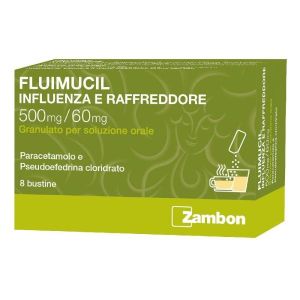Ship in Europe, Find out rates!
Fluimucil Flu and Cold 500mg / 60mg Paracetamol 8 Sachets

- box Delivery in Italy in 24/48 and free returns
- star3.000+ positive reviews
- dropboxOver 60,000 products in the catalog
Granules based on Paracetamol and Pseudoephedrine hydrochloride.
Therapeutic indications
Fluimucil Influenza e Raffreddore is used in the treatment of cold and flu symptoms.
Dosage and Posology
The drug should be taken according to the following doses and methods:
- Adults and children over 12 years of age: 2-3 sachets per day. Duration of therapy: maximum 5 days of therapy for the adult population; 3 days maximum of therapy for the pediatric population (12-18 years).
- Pediatric population: the drug is not recommended in children under 12 years of age.
Dissolve the contents of one sachet in a glass of water, stirring with a teaspoon and immediately drink the solution obtained. It is also possible to use hot water.
Overdose
In adults, the maximum daily dosage of paracetamol is 4 g; above this limit there is a risk of dose-dependent hepatotoxicity. A dose of 10-15 g (20-30 sachets) or 150 mg / kg of acetaminophen taken over a 24 hour period can cause severe hepatocellular necrosis and, much less frequently, renal tubular necrosis. Nausea and vomiting, the only early signs of intoxication, usually go away within 24 hours. Persistence beyond this time, often associated with right flank subcostal pain and hyperesthesia, may indicate the development of hepatic necrosis. Liver damage is maximum 3-4 days after ingestion and can lead to encephalopathy, hemorrhage, hypoglycemia, brain edema and death. Therefore, despite the lack of significant early symptoms, patients who have taken an overdose of acetaminophen should be rushed to hospital. Administration of activated charcoal should be considered if it is thought that paracetamol has been taken within the last hour in amounts greater than 150 mg / kg or 12 g (however, consider the lower limit). Acetylcysteine protects the liver when given by infusion within 24 hours of paracetamol ingestion.
The most common signs / symptoms of pseudoephedrine overdose include: mydriasis, tachycardia, hypertension, agitation / anxiety, sinus arrhythmia, hallucinations, tremor / hyperreflexia, vomiting; less frequently it is observed: hyperglycemia, rhabdomyolysis, acute renal failure. Most patients require only a short period of observation in the hospital; pharmacological treatment is required in the most severe cases (eg arrhythmias, hypertensive crisis, convulsions).
Contraindications
- Hypersensitivity to the active substances or to any of the excipients.
- Pregnancy and breastfeeding
- Children under the age of 12
- Patients with manifest insufficiency of glucose-6-phosphate dehydrogenase
- People suffering from a severe form of the following diseases: - coronary heart disease (angina, previous heart attack); - hypertension; - arrhythmias; - hepatic insufficiency; - kidney failure; - hyperthyroidism; - asthma; - diabetes; - urination disorders caused by prostatic hypertrophy or other pathologies; - glaucoma; - haemolytic anemia.
- Subjects who are being treated with monoamine oxidase inhibitors or who have stopped this treatment for less than two weeks
Side effects
Skin reactions of various types and severities have been reported with the use of paracetamol including cases of erythema multiforme, Stevens Johnson syndrome and epidermal necrolysis. Also with paracetamol, hypersensitivity reactions such as angioedema, edema of the larynx, anaphylactic shock have been reported. In addition, the following undesirable effects have been reported: thrombocytopenia, leukopenia, anemia, agranulocytosis, liver function abnormalities and hepatitis, kidney disorders (acute renal failure, interstitial nephritis, haematuria, anuria) gastrointestinal reactions and dizziness. In case of overdose, paracetamol can cause hepatic cytolysis which can evolve towards massive and irreversible necrosis.
Pseudoephedrine hydrochloride can cause dizziness, headache, nausea, vomiting, sweating, thirst, rapid heartbeat, precordial pain, palpitations, difficulty urinating, muscle weakness and tremors, anxiety, agitation, insomnia, hypertension, dry mouth, mydriasis and problems gastric. Ventricular arrhythmias can occur. Urinary retention may occur in patients with prostatic hypertrophy.
Pregnancy and breastfeeding
Fluimucil Influenza e Raffreddore is contraindicated in pregnancy, established or suspected, and during breastfeeding
Special warnings
During treatment with Fluimucil Influenza e Raffreddore before taking any other medicine check that it does not contain paracetamol, since, if this active ingredient is taken in high doses, serious adverse reactions may occur. The risk of serious side effects is also increased when paracetamol is taken together with other antipyretic analgesics; the simultaneous use of this type of medicinal product should therefore be avoided. The medicine should be used with caution in people with a mild / moderate form of the following diseases:
- coronary heart disease (angina);
- hypertension;
- arrhythmias;
- liver failure
- kidney failure;
- hyperthyroidism;
- asthma;
- diabetes;
- urination disorders caused by prostatic hypertrophy or other pathologies;
- glaucoma;
- haemolytic anemia.
Patients taking acetaminophen should avoid the use of alcoholic beverages because alcohol increases the risk of liver damage. During therapy with oral anticoagulants it is recommended to reduce the doses. The patient should be warned of the need to consult the doctor if he is already being treated with other medicines. The patient should be warned of the need to consult the doctor if he is already being treated with other medicines.
Fluimucil Influenza e Raffreddore 500 mg / 60 mg granules for oral solution contains: - sucrose: patients with rare hereditary problems of fructose intolerance, glucose-galactose malabsorption, or sucrase-isomaltase insufficiency, should not take this medicine . - sorbitol: patients with rare hereditary problems of fructose intolerance should not take this medicine. - aspartame as a source of phenylalanine, therefore it can be harmful to people with phenylketonuria.
Expiration and retention
Check the expiration date indicated on the package. The expiry date indicated on the package refers to the product in intact packaging, correctly stored. No special storage precautions.
Warning : do not use the medicine after the expiry date indicated on the package.
Composition
One sachet of Fluimucil Influenza e Raffreddore contains:
Active principle
Paracetamol 500 mg, Pseudoephedrine hydrochloride 60 mg.
Excipients
Sucrose, citric acid anhydrous, tropical fruit flavor, grapefruit flavor, sorbitol (E420), aspartame (E951), sucralose, sodium saccharin, polysorbate 20, beet red color, sodium phosphate riboflavin color.


